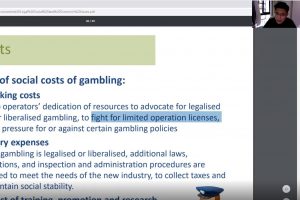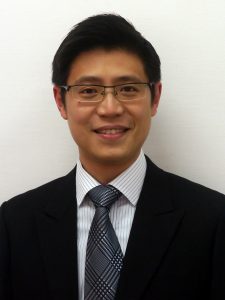Editor’s Note: Since the novel coronavirus outbreak and the consequent suspension of classes to prevent the spread of the virus, online education has become a hot topic in Macao, Hong Kong, and mainland China. Here at the University of Macau (UM), faculty members have been offering online courses to ensure that students keep learning amid class suspension. In the upcoming My UM articles, we will cover the online courses from different faculties and departments and take a closer look at how faculty members prepare these courses and how they monitor the students’ learning progress.
Faculty members in the Faculty of Business Administration (FBA) began preparing online courses at the start of the Chinese New Year. Every day, they prepare course materials, make teaching videos, and monitor the students’ learning progress. In fact, many of them report being busier preparing online classes than they were preparing traditional classes. In this article, Associate Professor Tang Mei Fung and Assistant Professors Qin Zhenjiang and Fong Hoc Nang from the FBA share with us their experiences with distance education.
Virtual Field Trip
Since early February, Associate Professor Tang Mei Fung in the Faculty of Business Administration has been teaching an online course in food and beverage (F&B) management to third- and fourth-year students of integrated resort and tourism management on UMMoodle and Zoom. According to Prof Tang, the course covers a wide range of topics related to F&B services, including menu design, restaurant atmosphere, strategies for enhancing overall service quality, and related administrative work. Although Prof Tang has been teaching this course for four years, she never slacks in course preparation and designs new handouts in each semester to reflect the latest changes in the industry. In transitioning to this new mode of distance education, she spends three times more time preparing for each online class and the biggest challenge she faces is how to increase student involvement.
Because of the epidemic, four resort field trips for her students have to be cancelled. ‘This is rather disappointing to the students because they really want to participate in more off-campus learning activities in order to prepare themselves for internships and jobs in the future, but I think they will understand,’ she says. To make it up to the students, she incorporates in her online classes materials on Virtual Field Trip, a website established by the Australian government that provides virtual tours of various famous hotels in Australia. Through this website, students can learn about the operations of these hotels at their own pace. Prof Tang also uses various online resources, such as videos, class presentations with commentaries, case studies, reading materials, and quizzes, to keep the students engaged.
Learning Is an Endless Journey
Prof Tang says that F&B management involves different kinds of knowledge, and it is simply impossible for anyone to become an expert after just one class; it takes months, or even years, of study and training to gain a decent understanding of the subject. ‘Take martinis for example,’ she says. ‘There are dry martinis and wet martinis, and there are different ways of mixing the ingredients to cater to different tastes. All this knowledge can be learned from case studies. I introduce students to the fascinating world of martinis and it’s up to them to decide how far they want to travel. In terms of food culture, Macao is similar to Guangdong, but it’s a big world, and I think Western food culture is worth understanding.’
Prof Tang’s relationship with the students is based on mutual respect. She says, ‘If they were not self-disciplined enough to learn with distance education, they would also lack the self-discipline to learn in a classroom setting.’ She encourages her students to ask questions via UMMoodle, WeChat or email, and to watch the teaching videos on Zoom for as many times as they like to enhance understanding of the course content. Having accumulated some experience in distance education, Prof Tang plans to continue using UMMoodle after the epidemic is over to monitor the students’ learning progress and to encourage self-driven learning.
Virtual Computer Classroom
This semester, Prof Qin Zhenjiang teaches two online courses to undergraduate and postgraduate students. One is about exotic option and structured finance products, and the other is about mathematical finance, both of which Prof Qin says are very important for students who plan to pursue a career in the financial industry. He explains, ‘Exotic options are options that are tailor-made to fit the investor’s specific needs and predictions about future market trends, so it plays an important role in the modern financial market. But on the other hand, the investor needs to understand the pattern of movement in the prices of financial assets, which is where mathematical models come in. In fact, multiple past recipients of the Nobel Prize in Economics received the prize for developing random mathematical models. But these two courses are both quite challenging theoretically, and place a lot of demands on the instructor in terms of course design and preparation.’
To ensure optimum learning outcomes, Prof Qin uses different tools and methods in his teaching, including traditional white boards, projectors, and virtual experiments done on computer. ‘I can use software to switch back and forth between the traditional white board and PPT slides,’ he says. ‘UM’s Information and Communication Technology Office also provides a Virtual Computer Room which I use to conduct virtual experiments with the students so they can learn by doing. These tools bridge the gap between distance education and classroom education and help students understand better even when there are a lot of formulae involved.’
Using Webcams to Create a Sense of Ceremony
Prof Qin requires all students to turn on their webcams for each online class so that he can observe their responses and insert some form of interaction at the right moments to create an atmosphere that is similar to that of classroom learning. ‘One of the challenges of distance education is the lack of facial feedback from the students,’ he explains. ‘But when we can see each other’s faces, we immediately feel this undeniable presence of the other person, which will remind the students that we are having a class, although an online one. So I always ask them to turn on their webcams.’
Prof Qin feels grateful for the assistance provided by the Centre for Teaching and Learning Enhancement, which he says allows him to conduct each three-hour-long class smoothly without any hiccups. During each class, he asks questions that encourage students to think and students have responded positively.
The Importance of Communication
This semester, Prof Fong Hoc Nang teaches an undergraduate course in casino management, which focuses on the historical development of the gambling industry in the United States (with comparison to the gambling industry in Macao), gambling-derived legal problems, and the industry’s social and economic effects. Prof Fong has been teaching the course for a month now, and he started with easier concepts, such as the organisational structure of casinos and gaming table management, to prepare students for more complex theories. Before 2 March, when the university resumed normal operation, Prof Fong taught the course by pre-recording a teaching video and uploading it to UMMoodle. ‘During the anti-epidemic period, my young daughter were staying at home, which made real-time teaching impossible because of the high likelihood of her constant interruption, so I had to make the teaching video while she was asleep,’ explains Prof Fong.
Prof Fong stresses the importance of communication during this period, which he believes not only can prevent students from feeling neglected due to the lack of face-to-face interaction, but can also serve as a form of psychological therapy by letting the students know more about the teacher’s situation. He says, ‘For example, I always explain to my students in detail about the changes in this semester, my teaching arrangements, and what I plan to do next. I also explained to them about the unique situation at home, and they have been very understanding.’
Inviting Industry Practitioners to Give Online Speeches
So far, everything has been going according to the original teaching plan, and students have been quite active in asking questions on WeChat. One student left a particularly deep impression on Prof Fong. He took notes diligently and asked Prof Fong ten questions after one class, to which Prof Fong replied on the same day. ‘I am really impressed by this student’s diligence,’ he says. Prof Fong uploads a test to UMMoodle every week. He requires the students to complete the test within a specified time period, but allows them to redo it for as many times as they want to encourage them to find the correct answers by themselves.
‘This exercise is designed to encourage students to find the answers in the textbook by themselves,’explains Prof Fong. ‘And I can also know from their revision records on UMMoodle which parts need further explanation. I believe this kind of positive reinforcement can offer students a deeper learning experience.’
In late March, Prof Fong will invite local industry practitioners to give online speeches to share real-life cases with the students. ‘I’ve talked to the guest speakers and my students, and we decided to stick to the original plan,’ he says. ‘I don’t want the students to lose the opportunity to learn from industry practitioners just because the mode of education has temporarily changed.’
UMMoodle
Launched in 2008, UMMoodle is an online teaching platform at UM, where students can obtain course-related learning resources including text files, PPTs and video clips. They can also submit assignments and take quizzes on the platform.Website: https://ummoodle.um.edu.mo/
Learning resources from UM’s Centre for Teaching and Learning EnhancementWebsite: https://go.um.edu.mo/6rjvczah
Related articles:
Distance Education Series: Interviews with FAH Professors
Distance Education Series: Interviews with FLL Professors
Distance Education Series: Interviews with FHS Professors
Distance Education Series: Interviews with FSS Professors
Distance Education Series: Interviews with FST Professors
Distance Education Series: Interviews with FED Professors
Source: My UM E-Version




